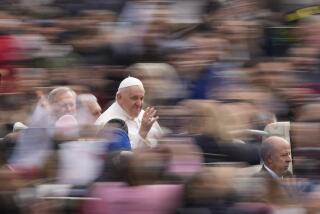EUROPE : Pope Launches Long-Awaited Pilgrimage to Ex-Soviet Union
- Share via
VATICAN CITY — Today, Pope John Paul II kisses the ground with special fervor.
As a priest in his native Poland, Karol Wojtyla watched neighboring Baltic states stagger, pillar to post, from Nazi occupation to Stalinism and the official atheism of Communist rule.
Today, in one of his most significant trips, John Paul launches a long-awaited first pilgrimage to the former Soviet Union. As the Pope himself has observed, his planned weeklong journey through the Baltic republics of Lithuania, Latvia and Estonia would have been “unthinkable only a few years ago.”
The 61st foreign journey of the pilgrim Pope’s 15-year reign opens this morning in the Lithuanian capital of Vilnius. On Wednesday, he goes to Riga, the capital of Latvia. On the way home next Friday, he visits Tallinn, capital of Estonia.
The rigors of last month’s trip to Jamaica, Mexico and Denver clearly sapped the 73-year-old pontiff, who a year ago underwent bowel surgery.
But he will challenge himself anew in a Baltic journey chockablock with the usual speeches and long ceremonies, motorcades and helicopter rides. In Lithuania alone, John Paul will deliver 15 addresses--13 of them in Lithuanian.
Whatever private joy his trip brings to a Polish Pope who contributed to the collapse of communism, John Paul’s public message is likely to be sobering to Catholics and non-Catholics alike in Baltic lands ruled as part of the Soviet Union until 1991.
The 8 million people in the Missouri-sized, three-nation wedge between Poland and the Gulf of Finland grapple with their independence amid deep-rooted economic and ethnic adversity.
To them, John Paul will preach brotherhood and Christian values as the fundamental underpinning of self-governing democracies now vexed by the strains of de-Sovietization.
In a Sunday address, he spoke of visiting Baltic lands that have overcome communism and “left the tunnel of forced atheization.” But, he warned, their next struggle must be against “the perils of indifference and secularism.”
The pontiff returned to a favorite theme on Thursday in a speech accepting the credentials of former Boston Mayor Raymond Flynn as the new U.S. ambassador to the Holy See.
“Tragically, the fall of the walls which separated East and West into two camps has made more evident the scandal of walls of poverty, violence and political oppression which still divide vast sectors of humanity,” he said.
He demanded commitments “safeguarding human rights and freedom, encouraging more participatory forms of government and establishing effective structures for the equitable solution of disagreements between nations and different ethnic and social groups.”
In Lithuania, where there are a dozen farmers for every tractor, the Pope will meet Catholics who paid dearly for religious convictions that became a rallying point against communism and drew the state’s ire with the seizure of churches and the jailing of priests.
“The holy father has been looking forward to the trip for a long time. You have to take into account the tremendous suffering of the people,” papal spokesman Joaquin Navarro said.
About 80% of the 3.8 million Lithuanians are Catholic in the most rural and economically depressed of the three republics and the only one from which Russian troops have been entirely withdrawn: The last 2,500 left this week on the eve of the papal visit.
Ironically, though, it is not the leaders of Lithuania’s independence revolt who will officially greet the Pope in Vilnius today, but a government led by former Communists elected earlier this year amid economic crisis.
Ethnic tensions that are sure to be the target of stern papal complaint mar early independence in Latvia and Estonia, where large communities of Russian settlers have been subjected to discriminatory actions by nationalist governments. Only in Lithuania have immigrant Russians been offered full citizenship.
In his Baltic speeches, John Paul may be counted on to demand full rights for minorities--for the Russians and for Catholics. About 20% of the 2.7 million Latvians are Catholics, but there are only a few thousand Catholics among the 1.5 million Estonians, most of whom are Lutherans.
More to Read
Sign up for Essential California
The most important California stories and recommendations in your inbox every morning.
You may occasionally receive promotional content from the Los Angeles Times.













